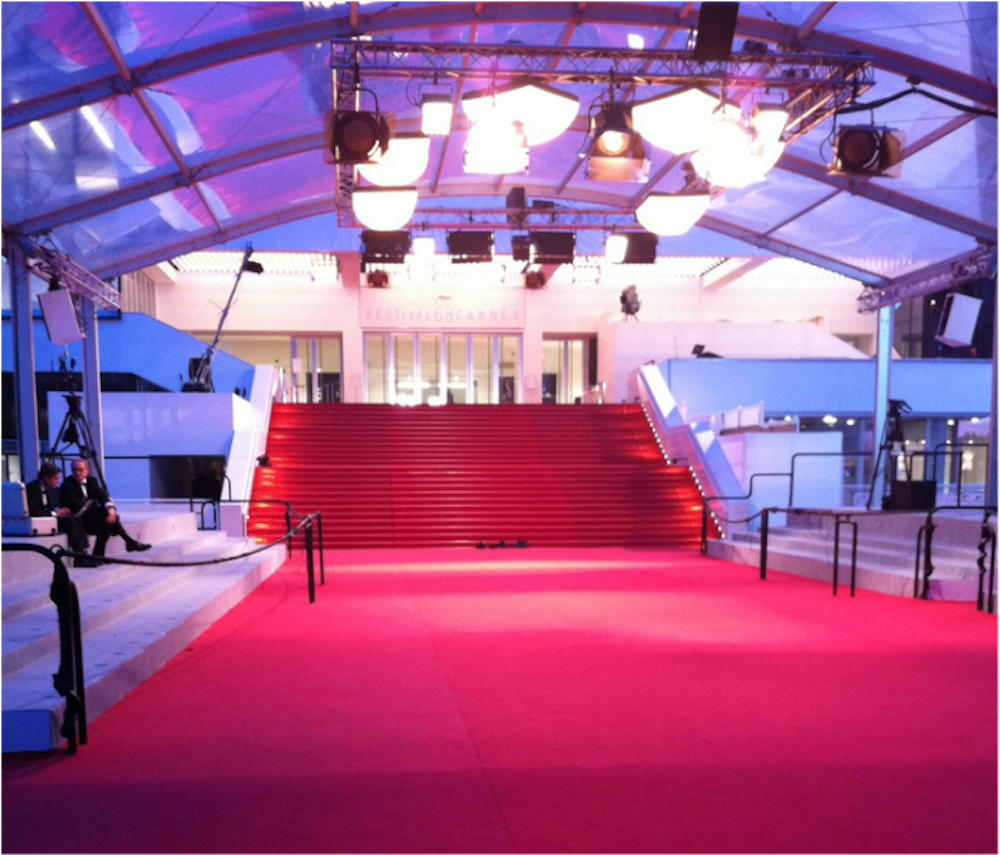Dear Festival de Cannes,
Our relationship hasn’t always been an easy one and yet for this culture journalist it has proven creative without fail, and that year after year. I may have complained about the hierarchy of credentials, burned my nose standing in long lines on the weekend under the scorching May sun, but deep inside I know the valuable lessons learned, the unbelievable meetings secured and the beautiful films watched thanks to your yearly event. You have changed my life — for the better.
This year, you pondered postponement, then your sidebars like Critics’ Week and the Quinzaine were cancelled and now your market is going online. But to me, the saddest news of all is that you are considering an online version of the festival. Here’s why I find that concept the death of cinema. The spirit that is cinema, I mean, the untouchable part of the seventh art.
In Venice in 2016 I sat down with filmmaker Ana Lily Amirpour. As we talked about cinema in general and the project she was presenting at the festival that year, she said “I feel like I make films to make friends.” And in that moment I realized I write about cinema for the same reason.
Those chance meetings with colleagues and publicists, the intimate conversations that last ten minutes with stars I’ve admired through their work for ages, the endless running from one screening to another and then to interviews, in retrospect is my definition of magic. Even sitting down inside a crowded cinema to watch for the first time in a public setting a future masterpiece, next to a total stranger who then becomes your partner in crime at this once in a lifetime event, that’s all the basis of this relationship I have with both my work and cinema. And with you, of course, Festival de Cannes. The true essence of it, what Amirpour called “a unicorn.” A creature we all wish existed but which feels unobtainable. She probably explained it better than I ever could when she elaborated on it, “It’s really rare,” then continued, “and even if you just have one meaningful interaction, like how you and I are talking now, and maybe we see each other in a year somewhere else, it’s more meaningful than an ongoing routine of pleasantries of ‘Hey, how are you doing?’”
Cinema is a communal sport, an experience that must be shared with others in an audience setting — I heard Martin Scorsese say once. I’m paraphrasing which is why I’m not putting it in brackets and I spent the entire morning searching for that statement, only to find Scorsese constantly quoted about Marvel films. So let’s for a moment talk about franchise movies, those big blockbusters that the general public waits in line to watch. Are they going to survive the lockdown, the social distancing? Because I tried to watch ‘Joker’ recently on a plane, before the Covid-19 crisis hit and it’s not a small screen affair. IMHO it would have never survived, as ‘Parasite’ never would have garnered its Oscar if everyone who watched it saw that peach on a 12 inch screen — where it looks like a tennis ball painted orange… Some movies need large screens. Not all, but some and those are the films that we typically watch in Cannes.
Alright, dear Cannes, forgive me, I digressed.
But honestly, where is the magic of cinema if you put the Festival de Cannes online? How will the chance encounters happen, like the hand Emma Thompson placed on my shoulder when passing by in a moment of public intimacy after a junket or the charming gesture by Adam Sandler to offer a roundtable of journos some of his grapes from the bowl? Will those happen on Zoom? They won’t.
During an interview in Dubai years ago, Thierry Fremaux said “watching a game on TV and being in the stadium, I’m talking about football [soccer for Americans], it’s not the same. Cinema is like that too.” Talk about a man who is passionate about the big screen experience! Fremaux also shared, “my kids, they are twelve and fourteen, the whole day are on their mobiles, but if I say Saturday night we go to the movies, suddenly they are as excited as if I say we go to the stadium.” This was three years ago, the kids are older but the sentiments I bet remain the same.
But perhaps my favorite quote by the Cannes Delegate General himself was the following, “cinema is cinema, there is something quite demanding about being in a movie theater.” One can’t expect a journalist at home to be focused on a film for its duration if Cannes goes online. You know as well as I do that we’ll all wander in our thoughts, get up to take a pee break, even check our mobiles while the film steams.
And in that small moment, that seemingly insignificant gesture, we’ll have lost cinema forever.
Because the magic of the movies is that you can witness a small miracle, a gem being born or even the worst film ever made flopping but it will be in a live arena, with people who become your comrades just by the sheer power of their presence and in a moment in time that can never be repeated. It’s called community and we’ve lost it these days. But we don’t have to kill it completely. Help us to fight for our community, of journalists, of filmmakers, of publicists and film festival organizers dear Festival de Cannes.
Wrapped up in that fight is our mutual chance of survival.
Yours truly,
Nina
